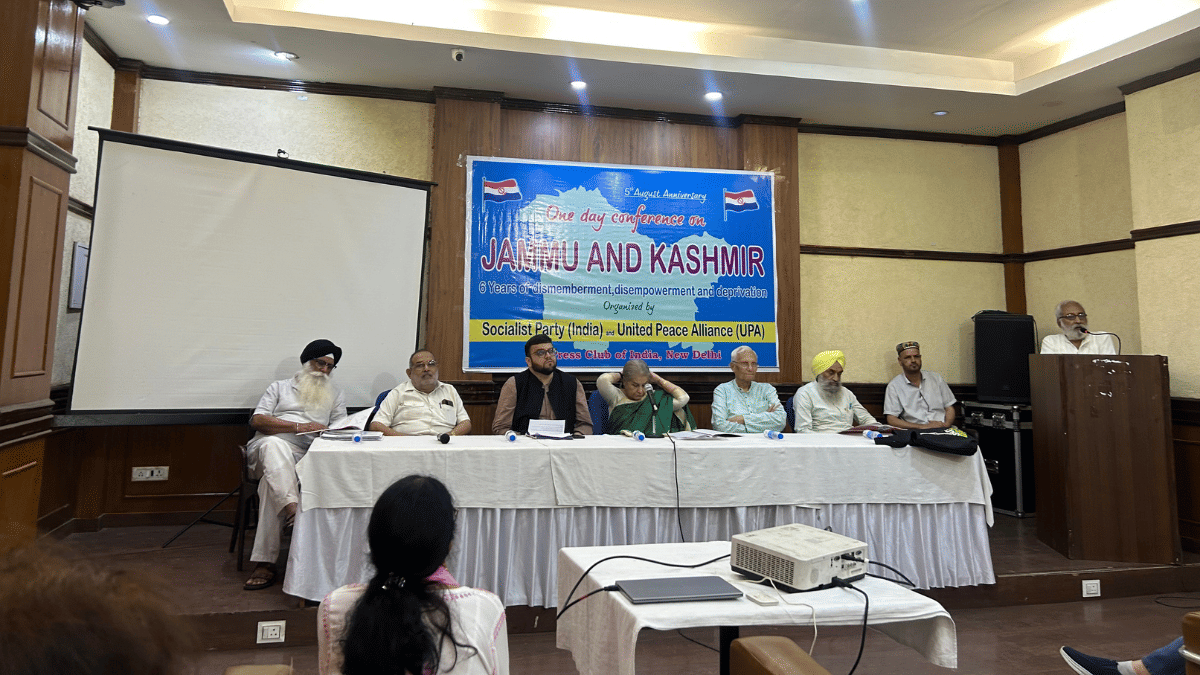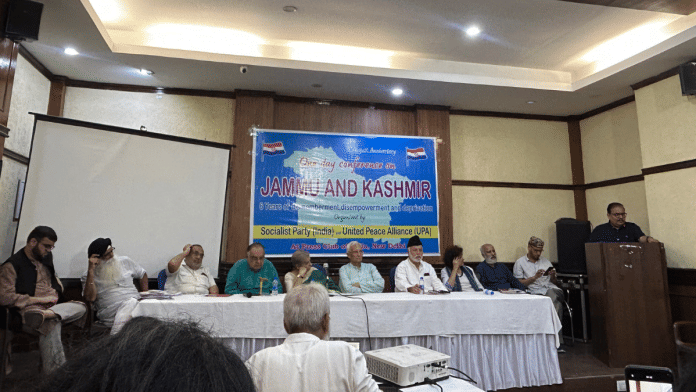New Delhi: Six years since the abrogation of operative portions of Article 370 and bifurcation of Jammu & Kashmir and Ladakh into two union territories, a united demand emerged from a discussion at the Press Club of India here, calling for the restoration of statehood and autonomy.
Those from J&K and other parts of the country who took part in the discussion—Jammu and Kashmir’s Six Years of Dismemberment, Disempowerment and Deprivation—on 5 August denounced the Centre’s 2019 decision as a grave blow to democracy and the Constitution.
They highlighted the “unfulfilled guarantees” promised by the government over the past six years during the abrogation process. “Kashmir is a long saga of unkept promises, unfulfilled guarantees, and heaps of reports and recommendations prepared by commissions and committees appointed by New Delhi, and constitutional distortions and subversions,” said Shahid Saleem, a national committee member of the Socialist Party (India).
The event was attended by prominent people from across the political, social and academic spectrum including Rashtriya Janata Dal (RJD) Rajya Sabha MP Manoj Jha, People’s Democratic Party (PDP) leader Aga Syed Muntazir Mehdi, Awami National Conference leader Muzzafar Shah, social activist Syeda Hameed, and feminist scholar Rita Manchanda, among others.
At least 15 members of the audience left the conference hall as soon as the conversation about the impact of abrogation began. “We thought they’d attend the conversation peacefully and participate but it looks like that is not even an option,” Saleem said, on the sudden exit of what he called “Right-wing workers”.
During the event, Socialist Party (India) also released a report—Kashmir Solidarity Mission—dedicated to the 26 people killed in the 22 April Pahalgam attack, and during armed hostilities between India and Pakistan that followed the launch of Operation Sindoor.
A 15-member delegation of Socialist Party (India) carried out the exercise between 25 and 31 May, visiting Jammu, Rajouri, Poonch, Pulwama, Uri, Srinagar, and Anantnag districts. During the visits, the team spoke to people from different communities including the survivors, displaced families, local civil society and community leaders.
Also Read: Spotlight on Article 370 verdict post Pahalgam. What SC said & Justice Khanna’s concurring opinion
‘Democratic demand for dignity’
Mehdi described the Centre’s 5 August 2019 decision to abrogate Article 370 and bifurcate J&K and Ladakh into two union territories as a rupture in India’s democratic fabric. He said the decision to abrogate the article did not just alter a legal provision but also “dismantled” a “historical pact” between the people of Jammu and Kashmir and the Union of India. “It was not just the abrogation of Article 370, but the abrogation of trust.”
He recalled how the erstwhile state, with its own constitutional identity and legislative powers, was stripped of autonomy overnight, without public consultation or a functioning legislative assembly. “What was done was not only legally questionable but also emotionally devastating,” he added, citing widespread detentions, communication blackouts, and curfews that followed the abrogation.

The speakers, including Mehdi, said the people of J&K were denied a voice in decisions that directly affected their lives. “Instead of empowering people, power was centralised. Dissent was criminalised. And the entire region was subjected to a militarised silence,” Mehdi said.
They also talked about the “trauma and alienation” felt by many in Kashmir since the abrogation.
“Our pain isn’t anti-national,” Mehdi said. “It is a democratic demand for dignity, justice, and representation.”
Manoj Jha called India a “coalition” of culture, languages, and states, and said people’s grievances cannot be erased through “optics, slogans and speeches”.
“Kashmir is not just a valley to be romanticised or demonised, it’s a place with people who have legitimate aspirations,” he said. Jha said Kashmir has often been used by political parties, especially the ruling BJP, as a political symbol in the Hindi heartland without paying much attention to the realities of Kashmiris. “Kashmiris are ours too, not just the land. You cannot shout ‘Kashmir is ours’ while silencing Kashmiris,” he said.
Awami National Conference leader Muzzafar Shah questioned the legality of the abrogation and called Article 370 “an irrevocable constitutional guarantee”.
In December 2023, the Supreme Court upheld the stripping of Jammu and Kashmir’s special status, and asked the government to conduct elections in the region by September 2024. The elections were conducted.
Muzzafar Shah, however, pointed out that the Article was not granted by foreign powers but formed through a historic agreement between two constituent assemblies, India’s and J&K’s.
He accused the government of using “brute force” to repeal the provision and also blamed the Supreme Court for endorsing it.
‘Injustice’ faced by tribals
Talib Hussain, a prominent tribal leader from Jammu and Kashmir, spoke about the ways in which the region’s tribal communities have suffered since the abrogation of Article 370 and highlighted that to give rights to tribals across India, the government introduced the Forest Rights Act, officially known as the Scheduled Tribes and Other Traditional Forest Dwellers (Recognition of Forest Rights) Act, in 2006. He said the right was granted to tribals across India under which they can work along with the government to protect the forests they live in. Hussain said this law could not be implemented in J&K under the garb of Article 370.
However, even after the abrogation, the government failed to provide the right to the tribals of J&K who over the years have “witnessed land grabs, violence and injustice,” said Hussain.
He cited alleged repeated demolitions of tribal homes, police torture and extrajudicial killings, demanding accountability and judicial inquiries. Hussain claimed a young tribal man died by suicide after alleged custodial torture, and another young tribal man was killed in a staged encounter after being framed as a militant.
He claimed that more than 2,000 tribal people were arrested in Kathua, yet no charges were proven. Accusing the state of targeting tribal voices, he urged civil society to speak out. “If a dog’s pup dies, civil society rises. But when our youth are killed, why is there silence?” he asked.
(Edited by Ajeet Tiwari)
Also Read: Spotlight on Article 370 verdict post Pahalgam. What SC said & Justice Khanna’s concurring opinion






